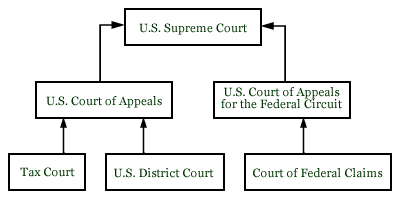
These are some sources for finding tax law cases online. Remember that in many databases you can filter by court as well.
The resources below are freely available:
These resources require a password to access a subscription database:
These sections of the Bluebook might be useful for citing tax law cases:
Also see the ABA's Tax Lawyer Citation & Style Manager (link is to 2021-22 edition).
Disputes can begin in three different places.
Cases begin in United States Tax Court if the taxpayer has not paid the tax. Trials in tax court are bench trials only. Tax court judges are appointed by the President and serve 15 year terms. Before 1943, this court was called the U.S. Board of Tax Appeals.
If the taxpayer has paid the tax, then the case begins in either Federal District Court or the Court of Federal Claims. The taxpayer is entitled to a jury trial in both of those courts.
Appeals from the US Tax Court and Federal District Court go to the US Circuit Court of Appeals from the Court of Federal Claims goes to the US Court of Appeals for the Federal Circuit.
Finally, appeals can go from the Circuit Courts to the US Supreme Court.

Thank you to Tiffany Robson, from GWU Law School, for this flowchart.
The US Tax Court issues three types of opinions:
1. Regular opinions are issued when the Tax Court believes it involves a sufficiently important legal issue or principle. A Tax Court Opinion can be cited as legal authority, and the decision can be appealed.
2. A Memorandum opinion is issued in a regular case that does not involve a novel legal issue. A Memorandum Opinion addresses cases where the law is settled or factually driven. A Memorandum Opinion can be cited as legal authority, and the decision can be appealed. (from US Tax Court website.)
3. Summary opinions come from the Small Cases Division, and involve $50,000 or less. They cannot be relied upon as precedent, and cannot be appealed.
The US Tax Court has its own Rules of Practice and Procedure. There are annotated versions of the Rules on Bloomberg, Lexis, and Westlaw. The Guide to Rules Amendments and Notes has historical explanations for the Rules.
Regular Opinions:
These can be found on the US Tax Court website.
They can also be found the Tax Court Reporter (CCH), in Law Library stacks at KF 6280 .C59, and online at Bloomberg, Lexis, and Westlaw.
Memorandum Decisions:
These can be found on the U.S. Tax Court Website, Lexis, and Westlaw
Summary Decisions:
These cases cannot be relied upon as precedent. However, you can find them on Lexis and Westlaw.
US Court of Federal Claims:
Decisions can be found online at the United States Court of Federal Claims website.
Federal Claims court cases are also on Westlaw, or in U.S. Tax Cases, in the Law Library stacks, KF 6324 .A52 C6
Appellate Case Reporters
Appeals to the Circuit Courts are published in regular reporters.
U.S. Tax Cases, in Law Library stacks, KF 6324 .A52 C6 is a commercial reporter that publishes appeals cases.
Both KeyCite from Westlaw and Shephard's from Lexis can be used as citators for tax law cases. However, there are several specialized tax citators:
Federal Tax Citator 2d (RIA) from Westlaw
VitalLaw has a Document History icon on the far left corner of each document.